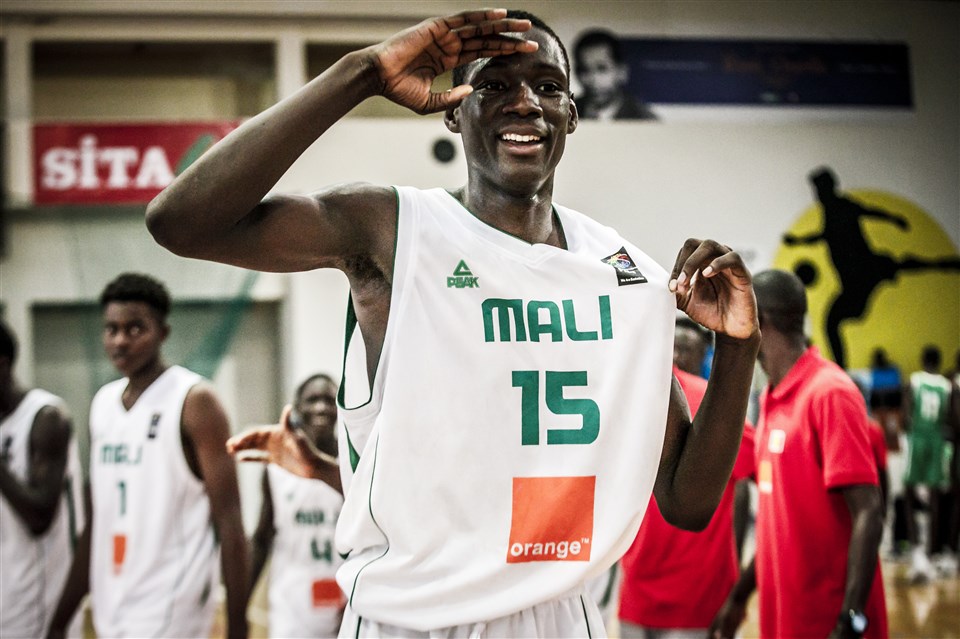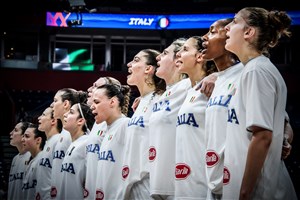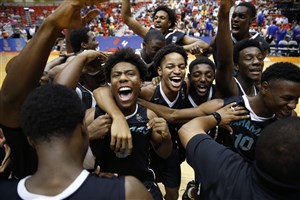
Egypt, Mali do it again at FIBA U16 African Championship, but Nigeria, Guinea closing gap
REGENSBURG (David Hein's Eye on the Future) - Egypt v Mali in the Final of the FIBA U16 African Championship is nothing new. But Egypt even getting a chance for a revenge victory to take the 2019 title and reach the FIBA U17 Basketball World Cup 2020 with Mali was in doubt for a while thanks to two emerging countries.
Egypt and Mali have now battled each other for the last three U16 continental crowns and four of the six tournaments - with Egypt's 66-57 victory in Praia, Cape Verde making it a fourth trophy the team brought back to Cairo following 2009, 2011 and 2015.
Moamen Abouzeid nailed 5 three-pointers in scoring 19 points in the Final for Egypt and ended up taking home MVP honors while fellow All-Star Five selection Abdullah Ahmed struggled with 4 points and 7 rebounds in fouling out after 21 minutes but did a solid job defensively in that time. Mahmoud Mohamed stepped up in collecting 9 points and 11 rebounds for Egypt, who gave up just 9 points in the second quarter and took the third frame 22-13 in building a 14-point lead in the opening minute of the last quarter.
🇪🇬 Egypt are crowned #FIBAU16Africa 2019 Champions!! 🏆🏆🏆🏆
— FIBA (@FIBA) July 14, 2019
➡ https://t.co/RFR7v23enT@EBBFED pic.twitter.com/nRoX9u4VgT
The Egyptians have yet to miss a U17 World Cup, winning the first two U16 African crowns in 2009 and 2011, taking second in 2013 and then winning again in 2015 before falling to Mali in the 2017 Final.
Even though Ahmed did not have a strong final statswise, he was clearly one of the main reasons Egypt got back to the U17 World Cup despite being not nearly as athletic as some of the other teams in Cape Verde. The big man, who averaged a double-double of 12.1 points and 10.9 rebounds with 2.3 blocks for the tournament, picked up 22 points, 11 rebounds and 4 blocks in the Quarter-Finals win over Rwanda and then collected 15 points, 16 rebounds and 2 blocks in the Semi-Finals against Guinea. He also tallied 19 points, 22 rebounds and 5 blocks in a Group Phase win over Angola.
Producing senior national team players
 Youssef Aboushousha playing in the FIBA Basketball World Cup 2019 African Qualifiers
Youssef Aboushousha playing in the FIBA Basketball World Cup 2019 African Qualifiers
The main thing for Egypt long term is producing players who will work their way into the senior national team. And the likes of Ahmed and Abouzeid, who averaged 15.3 points, could follow in the footsteps of past Egyptian leaders at the U16 level. Youssef Aboushousha and Ahmed Mostafa from the 2009 team both played in the FIBA Basketball World Cup 2019 African Qualifiers, Aboushousha appearing in all 12 games and Mostafa getting in three.The 2011 has already produced three senior team players with Omar Maatouk playing five qualifiers and Anas Mahmoud three while Ehad Amin competed at the FIBA AfroBasket 2015. Ahmed Metwaly from the 2013 U16 African competition played in three African Qualifiers games and Ahmed Khalaf, the MVP of the 2015 edition, played in eight qualifiers.
Living up to pressure
 Youssouf Singare will play a major role in Mali's chances next summer at the FIBA U17 Basketball World Cup 2020.
Youssouf Singare will play a major role in Mali's chances next summer at the FIBA U17 Basketball World Cup 2020.
Reigning champions Mali faced some serious pressure going to Cape Verde, from where they watched the stars of the 2017 title-winners Siriman Kanoute and Oumar Ballo guide Mali to the Final of the FIBA U19 Basketball World Cup 2019 Final in the biggest achievement for African basketball. Mali had reached the last two U17 World Cups and it was thanks to that development and experience that Kanoute and Ballo also helped Mali win the FIBA U18 African Championship 2018 - the country’s first title at that age category. Mali reached the U16 African Semi-Finals undefeated - but not in dominating fashion with just a four-point win over Tunisia, an eight-point victory over Cote d’Ivoire and a six-point triumph over Guinea. The western Africans' talent level was not as high as two years ago though the trio of Abdramane Kanoute, Brehima Seydou Traore and All-Star Five selection Youssouf Sangare was solid along with the excellent glue guy Daouda Modibo Dembele.
Sure, Mali ended up losing in the Final - hitting just 28.4 percent from the field - but it was a matter of mission accomplished in continuing the development of the program by getting to the U17 World Cup in Bulgaria next summer.
Nigeria close gap with very young team, future looks bright
 Nigeria had a lot of reasons to celebrate at the FIBA U16 African Championship 2019, even though they didn't reach the FIBA U17 Basketball World Cup 2020.
Nigeria had a lot of reasons to celebrate at the FIBA U16 African Championship 2019, even though they didn't reach the FIBA U17 Basketball World Cup 2020.
The U16 African tournament did have two revelations - with both Nigeria and Guinea reaching the Semi-Finals thanks to improved efforts back home.
Starting with Nigeria, who were back in the competition after not playing in 2017 and having finished fifth in 2015. The country picked up a third place in their only other appearance in 2009. Nigeria are also the record champions at the FIBA U18 African Championship, having won seven of the 19 tournaments and also grabbing three third place finishes. But they last played in that tournament in 2010 and picked up bronze in 2006 after having completed two three-peats from 1990 to 1998 and 2002 to 2006.
Nigeria's U16 team was made up of players from the Nestle Milo Secondary Schools Championship - a competition sponsored and organized by the Nestle Milo Beverage brand, under the parent company Nestle Nigeria Plc. Nestle Milo has run the national youth tournament since 1999 and produced former NBA draft picks Chukwudi Maduabum and Solomon Alabi while long-time Nigeria international Olumide Oyedeji did not play in the competition but took part in other events associated with the competition.
The Nigeria team featured six players who were born in 2004 - so a year younger than the rest of the competition. And three of those were even 14 years old as they were born in October or December 2004. And despite only eight players playing, Nigeria lost the opening game to Egypt by only nine points before beating hosts Cape Verde by 25 points, Angola by 33 points and Tunisia by 50 points in the Quarter-Finals. But the more physical Mali team was too much in the Semi-Finals, keeping it close for two and a half quarters before Mali won 54-45. To make matters worse, David Esuloa played just 10 minutes as he went down injured, cutting the number of available players to seven. Nigeria did bounce back to get the third spot on the podium with a 54-53 win over Guinea. This feat was made all the more impressive given the fact that Kuti Dickson - one of the best players on the team - did not play a single game.
But the future looks bright for Nigeria with the six 2004-born players, meaning that sextet would be eligible to play at the FIBA U18 African Championships in 2020 and 2022 and try to get Nigeria back to the U19 World Cup for the first time since 2007, which was the end of a streak of six straight appearances dating back to 1987. Watch out for Nigeria if they play next summer at the FIBA U18 African Championship, which would their first appearance since 2010.
Guinea youth efforts paying off in return
 Thierno Mamoudou Sylla was a standout for Guinea in Cape Verde.
Thierno Mamoudou Sylla was a standout for Guinea in Cape Verde.
Guinea have never played at either the U17 or U19 World Cup, but the fruits of the federation's labor nearly got them to their first one - as they lost to Egypt 71-67 in the Semi-Finals and finished fourth after losing to Nigeria in the Third Place Game. They showed they belonged, losing to Mali in the Group Phase by only six points before beating Angola by 23 points only to fall to Egypt and then Nigeria by a single point in the Third Place Game. And the western Africans also showed they have some talent with Ibrahima Diallo making the All-Star Five while Abdoulaye Donzo and Thierno Mamoudou Sylla also impressed.
Guinea were back in the competition for the first time since 2009, when they finished ninth. The federation launched a youth development program about five years ago with youngsters training at a national center for basketball. The country returned to the FIBA U18 African Championship last summer for the first time since 2006 and took ninth place after beating Algeria and Uganda. And the team at the U16 championship included five 2004-born players, meaning they can play twice at the U18 continental championship. This is a country with a tradition of success, grabbing third place at the U18 level in 1987 and 1994 and winning the U18 tournament in 2000, when they hosted the continent.
Angola suffer big fall in return
 Bruno Fernando and Silvio Sousa (left and second to left, respectively) were All-Star Five selections at the FIBA U18 African Championship 2016.
Bruno Fernando and Silvio Sousa (left and second to left, respectively) were All-Star Five selections at the FIBA U18 African Championship 2016.
The re-emergence of Nigeria and Guinea was met with the disappointment of one former powerhouse. Angola won just three of seven games in finishing seventh of 10 countries, beating hosts Cape Verde twice by 13 and 26 points and picking up a 20-point win over Algeria. But Angola, who won their only U16 African crown - and only podium finish - in 2013, also registered some nasty losses.
They dropped their opening game by 25 points to Egypt and after the win over Algeria lost by 33 points to Nigeria. A win over Cape Verde finished the Group Phase but Guinea were the next to pound Angola with a 23-point loss and then Rwanda knocked off Angola 72-70 in the Classification 5-8 game before Angola at least ended their tournament on a high note with another win over Cape Verde.
Angola were one of the powers in youth African hoops for a while with three of the first five U18 crowns between 1980 and 1988 as well as seven second-placed finishes and three third places in their first 13 appearances in the event. But the rest of the continent clearly caught up with Angola managing just one podium finish since 2008 - winning the 2016 title. At the U16 level, Angola won the 2013 crown but that was the only top-three finish plus taking sixth in 2009 and seventh this summer. On top of that, Angola did not appear in the event in 2017. A closer look at the country's two most-recent youth titles shows that they were more a product of a great generation as Silvio Sousa was a leader of both teams with Joao Jungo helping win the U16 title and Bruno Fernando made up the other half of the U18 two-headed monster.
Noticeable no-shows
 Senegal finished second at the FIBA U18 African Championship 2018 - in their first youth tournament since 2013.
Senegal finished second at the FIBA U18 African Championship 2018 - in their first youth tournament since 2013.
With Nigeria and Guinea both coming back to the competition, there were still a couple of countries who were missing. South Africa had played in three of the first four U16 events but did not play in 2017 and pulled out of the 2019 edition just days before the opening tip-off. Democratic Republic of Congo played in the last two FIBA U18 African Championships but have not appeared at the U16 level since 2013. Senegal just finished second at the U18 level in 2018 after a six-year absence but have yet to play at the U16 competition - neither have Cameroon.
So, while the FIBA U16 African Championship 2019 has provided plenty of storylines, the big one that matters is that Egypt and Mali faced off in the Final - again. And both will represent Africa in the FIBA U17 Basketball World Cup next summer - again. We will have to wait two more years to see if someone can take them both down.
David Hein
FIBA
FIBA's columnists write on a wide range of topics relating to basketball that are of interest to them. The opinions they express are their own and in no way reflect those of FIBA.
FIBA takes no responsibility and gives no guarantees, warranties or representations, implied or otherwise, for the content or accuracy of the content and opinion expressed in the above article.





















